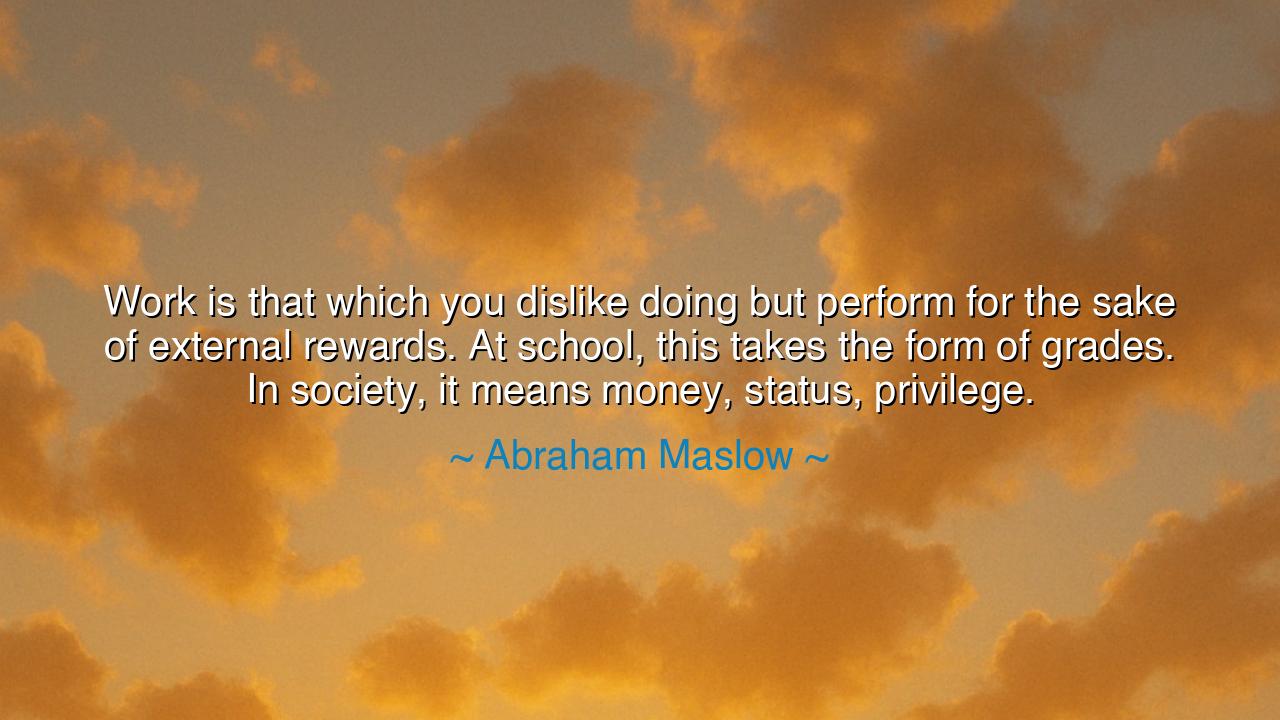
Work is that which you dislike doing but perform for the sake of
Work is that which you dislike doing but perform for the sake of external rewards. At school, this takes the form of grades. In society, it means money, status, privilege.






In the vast arena of human existence, there is a force that shapes our lives, directs our energies, and drives our aspirations. This force, known to many as work, is not always a noble pursuit, nor one that brings joy to the heart. Abraham Maslow, in his profound wisdom, once said, "Work is that which you dislike doing but perform for the sake of external rewards. At school, this takes the form of grades. In society, it means money, status, privilege." These words resonate deeply, for they reveal the truth about much of our labor. We toil not out of passion, but for the rewards that come from others—rewards that validate our place in the world, that affirm our worth in the eyes of society.
Work, in this sense, becomes a burden, a necessary evil to attain the rewards of society. It is not an expression of our inner calling or personal joy, but rather a means to secure material wealth, social standing, and the approval of those around us. For many, work is the price paid for the privileges of life—the means to feed one’s family, to gain access to the comforts of a home, to secure a future that is perceived as successful. Yet, as Maslow so insightfully points out, this labor is done not for the love of the work itself, but for the external trappings that society places upon it.
Let us look upon the ancient warriors who fought not for the glory of battle, but for the spoils of war—for land, for riches, for honor in the eyes of the king. These men, fierce and mighty on the battlefield, did not wield their swords for the love of combat, but for the rewards that would follow. The great empires of old, from Rome to Persia, were built upon the backs of those who labored, not for the satisfaction of their hearts, but for the external symbols of success—the titles, the riches, and the power that would place them above others. In this way, their work, though grand in its scope, was ultimately empty, as it was motivated by external rather than internal desires.
Maslow’s words also resonate within the walls of the modern classroom. How often do we push our children to study not for the love of learning, but for the grades that will validate their intelligence in the eyes of others? The desire for academic success becomes less about the pursuit of knowledge and more about achieving external recognition. The grade becomes the reward—a symbol of status within the social structure of the school. This distortion of the purpose of learning is not a new phenomenon but has been embedded in human history for centuries. The true purpose of education, that of growth, self-discovery, and intellectual awakening, is often overshadowed by the pursuit of grades, the ultimate external reward.
Yet, dear listener, it is not enough to merely acknowledge this truth. Maslow compels us to look deeper, to examine the very nature of our motivations. The question that we must ask ourselves is this: What is the true purpose of work? Is it merely to gain external rewards, or is it to find fulfillment in the act of doing, to express our inner purpose, and to contribute to the greater good? Let us not forget the heroes of the past—those who worked not for riches or status, but for a higher cause. Leonardo da Vinci, for instance, was not driven by wealth but by a passion for discovery, a calling to contribute to the advancement of humanity. His works were not made to impress kings or to gain riches; they were born from an inner desire to understand and create. Da Vinci’s legacy was not one of material wealth, but of intellectual contribution, of a work that transcended the external rewards of his time.
The lesson here, dear listener, is a powerful one. Work, in its purest form, should not be an external sacrifice made solely for status, money, or privilege. True work is that which brings the soul to life, that which expresses the deepest yearnings of the heart. It is not enough to perform labor simply for the reward that follows. The meaning of work lies in its ability to align with inner purpose, to serve not just ourselves, but the greater good. For it is through work that we contribute to the world, that we leave our mark upon the earth, and that we find fulfillment in the very act of creation.
Let us, then, redefine our relationship with work. Let us seek to labor not merely for external rewards but for the joy and satisfaction that come from meaningful contribution. Ask yourself not, "What will I gain from this work?" but, "What can I give to the world through this work?" The heroes of history, the ones who left legacies that transcended time, were those who worked not for themselves, but for a purpose greater than their own ambitions. If we can shift our mindset from the pursuit of external rewards to the pursuit of meaningful labor, then we will be truly alive, truly engaged, and truly fulfilled in the work that we do.
And so, let us go forward, not as those who labor for the empty rewards of society, but as those who seek the fulfillment of the spirit through our labor. Let our work be a reflection of our inner calling, and may we find joy not in the rewards that come after, but in the work itself, knowing that in each act of creation, we are shaping the world and fulfilling our highest purpose.






AAdministratorAdministrator
Welcome, honored guests. Please leave a comment, we will respond soon